RISE MODULE: SPORTS AS A VEHICLE FOR SOCIAL CHANGE
Objectives:
- Examine examples of professional athletes using sports as a vehicle for social progress.
- Encourage participants to identify ways in which they can use their platform.
Duration: 40 minutes
Materials:
- Participant handout (five; one per group)
- Pens (one per participant)
"Sport has the power to change the world. It has the power to inspire.It has the power to unite people in a way that little else does." — Nelson Mandela
Facilitator Instructions:
- Introduce the activity to the participants by providing the following background information:In February 2017, RISE developed a report, From Protest to Progress: Athlete Activism in 2016, which evaluates the reach and impact of activist athletes in the latter half of 2016. The report research included a survey of more than 225 examples of athlete activism during this period. RISE grouped these actions into six categories: protest, public statements, special apparel, collective action, community outreach and financial contributions. What received the most attention in 2016 were athlete protests. RISE defined protest in the report as actions that intentionally defy existing rules or conventions with an aim of raising awareness or showing solidarity.
- Ask the participants to share examples of protests from athletes. It is likely that Colin Kaepernick kneeling will be provided as an example.
- Ask the participants why they feel that protest received the most attention. Example responses:
- Protests often occurred before the game where television viewership was high.
- Protest often is considered to be controversial - controversy receives high media coverage.
- Our country has a history of protest to bring awareness to social injustices.
- Explain that although protest was the headline leader, athletes used their platform in other ways. The purpose of this activity is to gain an understanding of the other types of actions taken by athletes to drive social progress.
Part A:
- Divide the participants into five groups and assign one category to each group: public statements, special apparel, collective action, community outreach and financial contributions.
- Instruct the group to refer to the participant handout and work together to answer the questions outlined.
- Inform the participants that they will have five minutes to complete this part of the activity before coming back together to share with the larger group.
Participant handout questions:
- What is the definition of your group's assigned category?
- What are examples of actions in this category? List the names of athletes or other leaders in sports who have taken this action. Examples can be during any point in history
- After five minutes, ask each group to present a summary of their category definition and examples identified. Ensure the definitions used in the report are communicated.
Category Definitions:
- Public statements involve oral or written communications from individual athletes, teams or organizations to address specific issues. These statements may occur at a news conference or appear on a website, in a magazine or on social media.
- Social apparel, most often in the form of custom-designed shirts and shoes, is worn to amplify social justice causes, often with club or league support.
- Collective action occurs when people go beyond individual gestures or statements to show solidarity as a group in support of social justice causes.
- Community outreach takes place when athletes and/or teams partner with community groups and leaders, such as government officials, seeking social justice at the local or national level. The actions seen in 2016 often were geared toward creating dialogue, increasing understanding of different perspectives and, at times, changing policy.
- Financial contributions include any monetary donation made by athletes or teams to organizations and initiatives to demonstrate their commitment to and support for a cause.
Part B:
- Instruct participants to return to their small groups and direct their attention to their participant handout.
- Explain that their challenge is to determine which example from the handout aligns with their assigned category and then document their ideas about the impact of the action taken: What was the impact? Who was impacted? What is their assessment of the action?
- Inform participants that they will have five minutes to complete this portion of the activity before coming together to share with the entire group.
- After five minutes, bring all of the groups together to share summaries of their discussions.
- Conclude this portion of the activity by facilitating a discussion using the following questions as your guide:
- What power do athletes have (if any)? How can that power be leveraged? What can it be leveraged to do?
- Reflecting on the actions taken by the athletes we have discussed today, what are your thoughts on the role professional athletes should play in speaking out on social justice issues?
- What restrictions to action might there be in sports?
- What role should athletes play at the high school and college levels?
- What are ways those in the sports industry (athletes, coaches, administrators, etc.) can use their sports platform for social progress? (Possible responses: Hold an event to celebrate diversity, volunteer in the community, meet with a local government official to discuss policy change, hold a fundraiser for a specific cause, etc.)
- How can RISE support your efforts?
Please note: The facilitator version of the images includes information on the category of activism. Please use the separate handout for participants.
NFL Players Malcolm Jenkins and Anquan Boldin Release a Video Explaining Their Protests
September 6, 2017 (Public Statement)
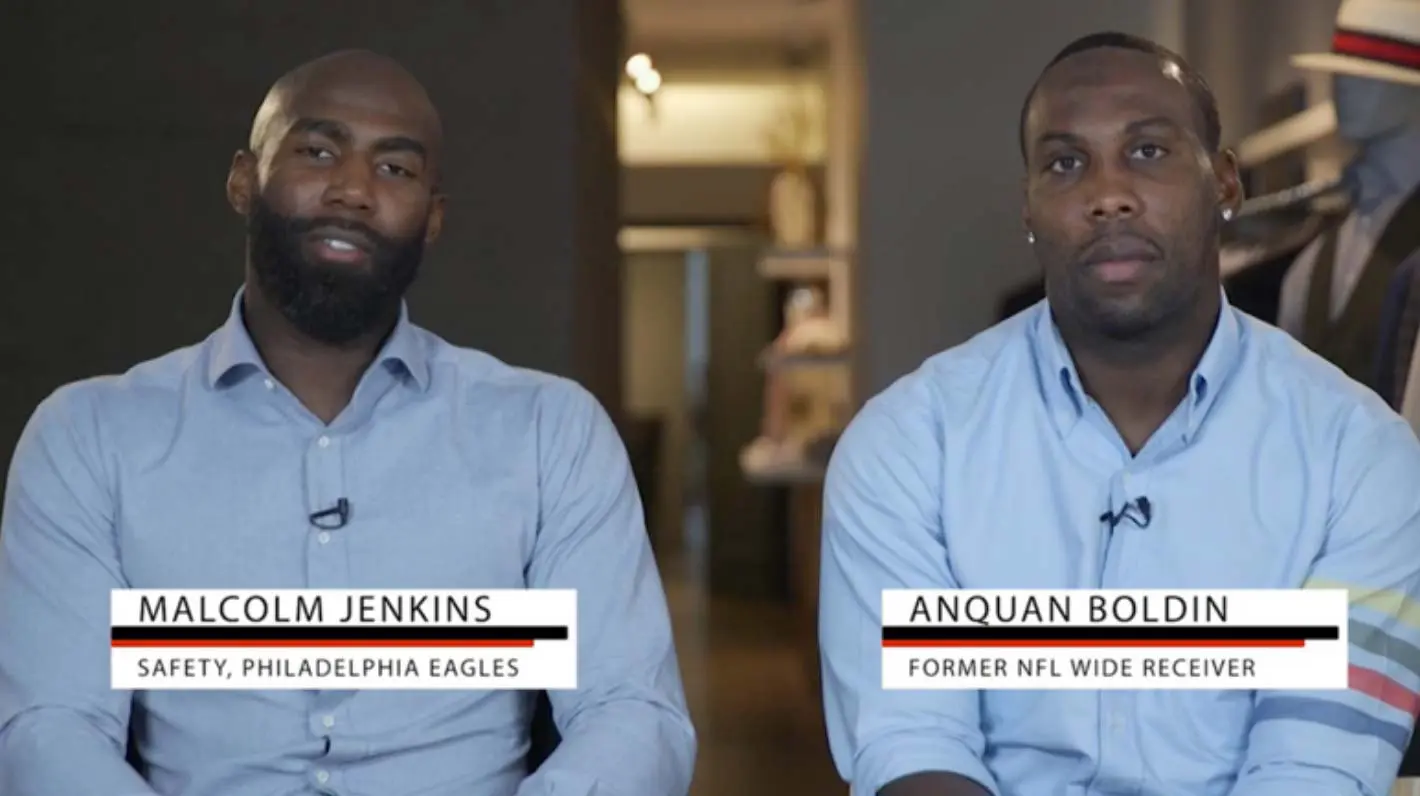
Source: click here
Boldin
"One of the many things that make our country great is that it was founded on the idea of justice for all. And we feel that it's our responsibility to take a stand against the injustices that we see happening in America right now."
"We're looking for police accountability so we can rebuild trust and work together to make our communities safer. This is about lifting up our communities and treating them with the dignity and support they deserve."
Jenkins
"We're fighting to pass Clean Slate legislation in the state of Pennsylvania that would automatically seal non-violent misdemeanor records after 10 years."
"Whether you think it is a protest or a demonstration, really, it doesn't matter. As long as we are keeping these conversations going long enough to redirect some of that attention to the work, to the actual call to action, it's worth it."
"Athletes have been doing this work for a long time. We just don't hear about it, and it doesn't get the same kind of hype. That's where these demonstrations are useful, because regardless of how you feel about them, they keep that conversation going."
Marcus Peters, Jimmy Graham and Other NFL Players Wear "Justice for All" Cleats
September 7 and 10, 2017 (Special Apparel and Collective Action)
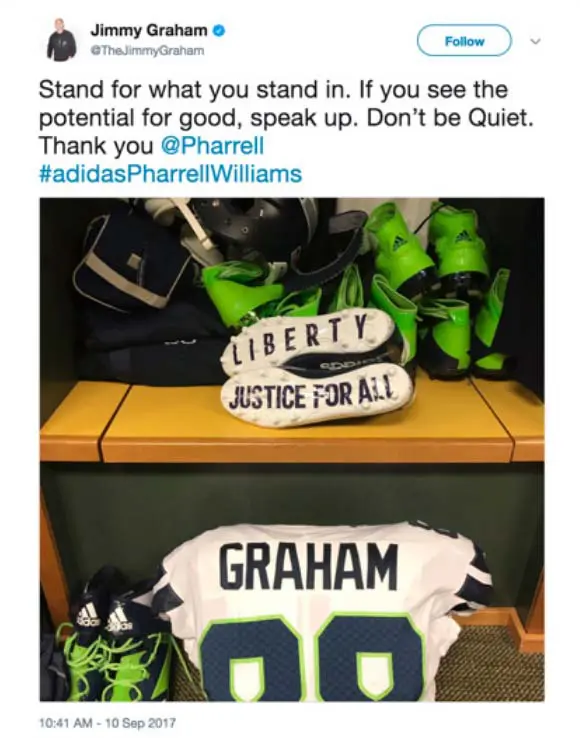
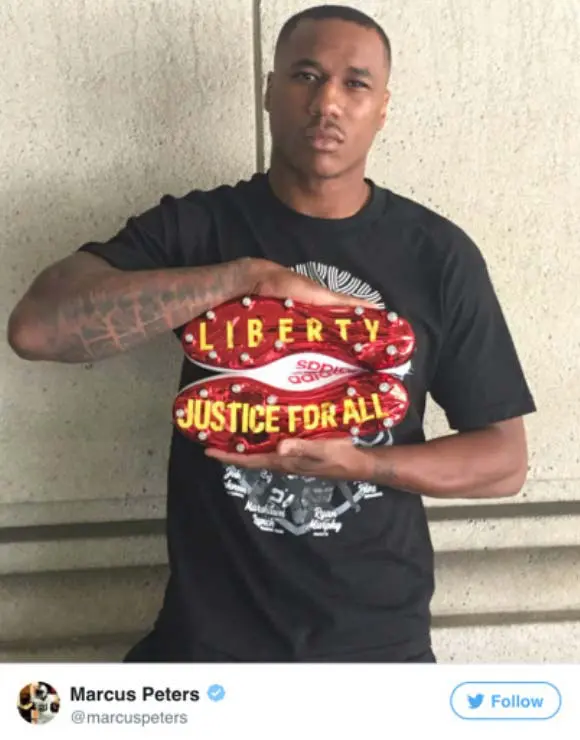
WNBA Teams New York Liberty and Minnesota Lynx Host a Unity Game in New York City
August 20, 2017 (Collective Action)
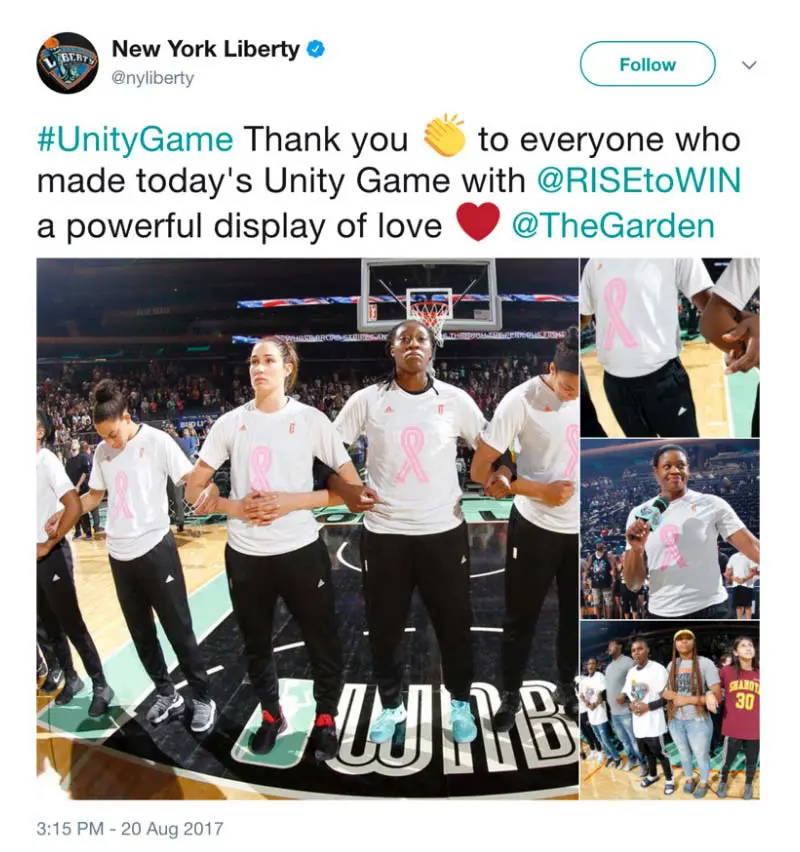
Colin Kaepernick Makes Another $100,000 Donation Toward His $1 Million Pledge
September 7, 2017 (Financial Contribution and Public Statement)
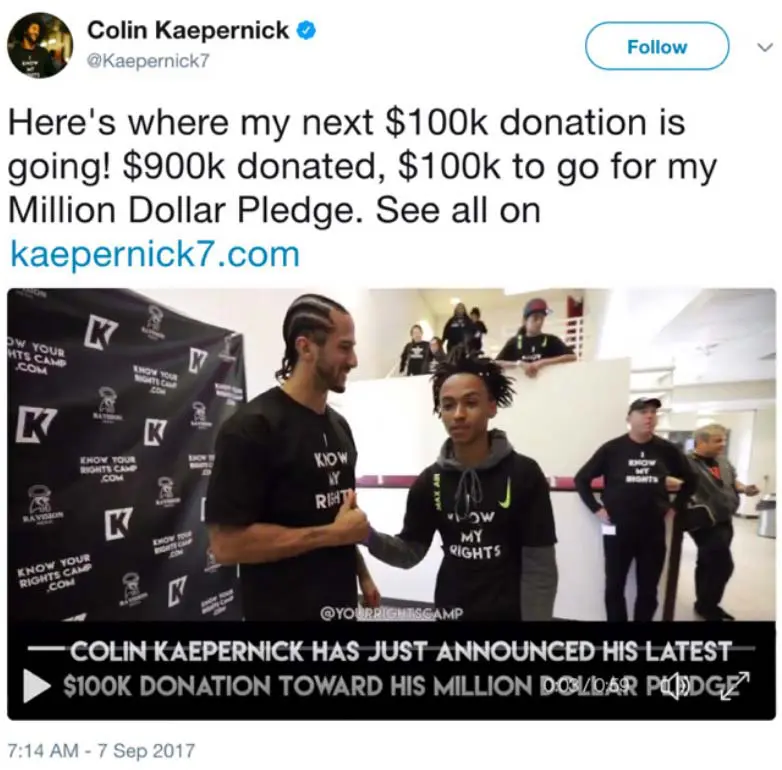
Serena Williams Responds to Racist Remarks About Her Child
April 24, 2017 (Public Statement)
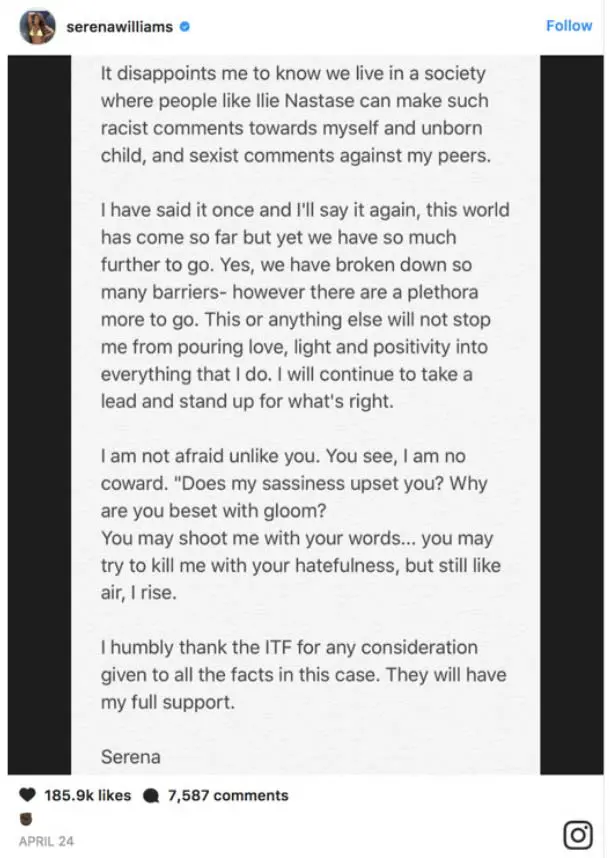
NFL Players Aaron Rodgers and Tom Brady Address Colin Kaepernick's Free Agent Status
August 30 and September 17, 2017 (Public Statement)

Source: click here
Aaron Rodgers
"I think he should be on a roster right now. I think because of his protests, he's not."
"I'm gonna stand because that's the way I feel about the flag — but I'm also 100 percent supportive of my teammates or any fellow players who are choosing not to. They have a battle for racial equality. That's what they're trying to get a conversation started around."

Source: click here
Tom Brady
"I've always watched him and admired him, the way that he's played. He was a great young quarterback. He came to our stadium and beat us and took his team to the Super Bowl in 2012. He accomplished a lot in the pros as a player. And he's certainly qualified, and I hope he gets a shot."
Part C:
- Ask participants to pair up and produce a one-minute video with their mobile devices. The video should address the following items:
- Experiences in sports so far and how they may have been influenced by their identity (racial, socioeconomic, gender,etc.).
- How, if at all, sports has allowed them to “rise” beyond these social influences.
- Discuss what they may be able to do in their communities (home, school, church, office, etc.) now that they see the value of sports in bringing about social change.
- The completed video should be sent to education@RISEtoWIN.org. We also encourage posting on social media. When doing so, please tag/mention RISE.
Key Takeaways:
- Athletes are leaders.
- There are multiple ways to bring about change. Everyone doesn't need to lead in the same way.
- There are challenges to bringing about social change.
Next Steps: Take the following actions after completing the activity with your team.
- Share photos on social media and tag/mention RISE.
- Facebook: @RISEtoWIN
- Instagram: @RISEtoWIN
- Twitter: @RISEtoWIN
- Snapchat: @RISEtoWIN
- Discuss your experience with students, athletes, coaches, athletic department staff and other organization members. Identify ways you and your school/organization can help lead the way in improving race relations and driving social progress.
Feedback:
RISE welcomes feedback as we seek to continually improve our tools and resources. We encourage allparticipants to share their feedback by completing an online survey at bit.ly/risetools. Our Leadership &Education Programs team can be reached at education@RISEtoWIN.org.
This module is an adaptation of #the4thBox Cut-out Edition activity from the Interaction Institute for Social Change.
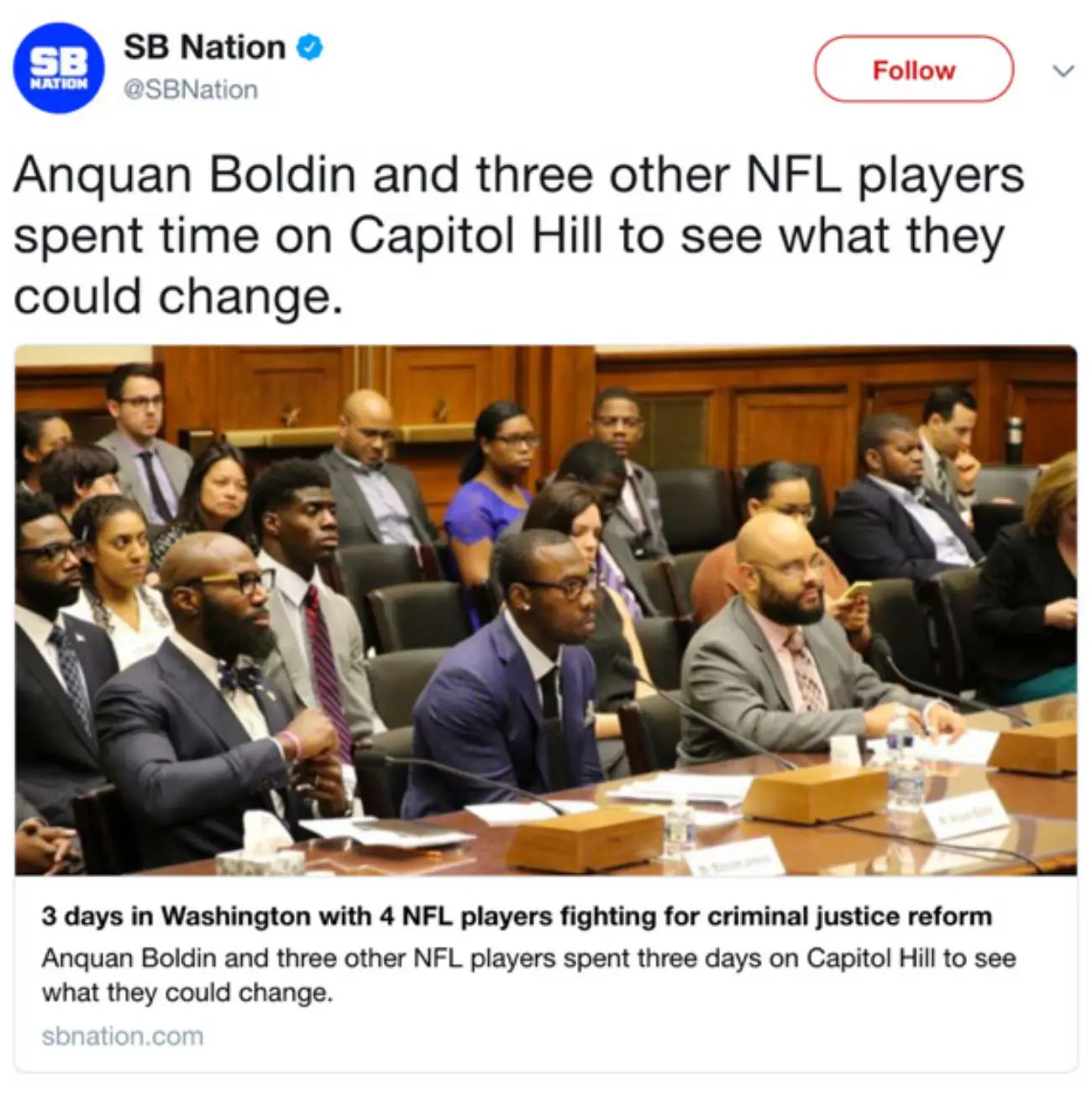
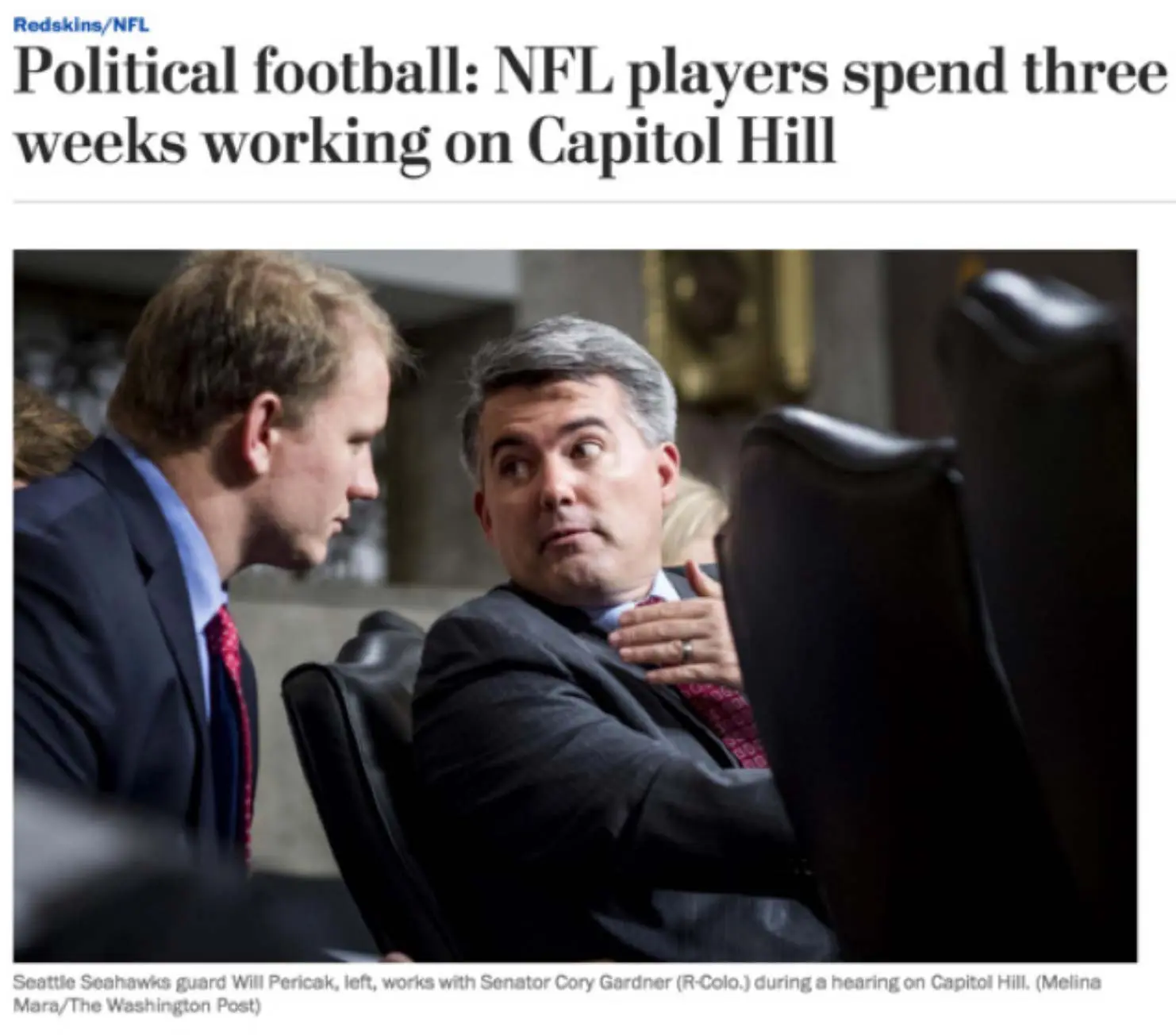
Our
Partners
Stay
In Touch
Follow us on social media.